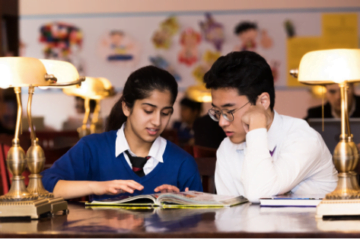With 1.5 million schools and over 260 million enrolments, India has the world’s largest primary and secondary education system. The learning in India’s education system is driven by the fear of exams and a one-size-fits-all approach.
Students are taught to solve queries, not ask queries. The focus of our education policymakers has primarily been towards improving the access to education rather than improving quality.
Though members acknowledge internationalization of higher education as a priority they overlook that it is the foundation which prepares students for higher education. Indian institutions following the International Baccalaureate (IB) programme for primary and secondary education differentiate themselves by offering a non-conventional learning experience to students, rather than just rote learning.
The core of IB teaching methodology is ‘how to learn’ rather than ‘what to learn’, with an objective to create global citizens. The high standard of IB is recognized and is considered a higher academic programme.
To improve the education system in schools, we need structural changes:
*Curriculum and ideology: The first step is to adopt a learner-based pattern of education—multidisciplinary, immersive and skill-based curriculum focusing on a balanced approach towards learning.
* Arts and sports as a career option: The rule maker and parents need to accept arts and sports as mainstream careers for children and not just as alternate subjects.
* Collaboration and partnership: The role of industry-academic linkages across the education value chain can’t be put aside.
* Strengthen infrastructure: There is a need to incentivize private and foreign participation to widen the applicability of virtual classrooms.
* Active governance and leadership: A regulatory framework focusing on autonomy, compulsory accreditation and regulation of schools is quintessential.
The Indian education system must adopt a balanced approach towards learning, and focus on the merits of internationalization. This is to position itself on the world map as an attractive education destination.
In today’s fast-paced globalizing world, International school education has become crucial for various reasons. Most importantly, it is to enhance the education of students with a global perspective. Hence, IB curriculum comes into the limelight; in addition, any school authorized by the IB Organization is called as an IB School.
Curriculum
Founded in Geneva, Switzerland in 1968, IB or International Baccalaureate support schools in the implementation of four challenging and highly respected programmes of international education worldwide incorporating Primary Years Program, Middle Years Program, Diploma Programme, and Career-related Programme.
IB curriculum has secured a sky-high reputation for its high academic standards of teaching, ideological leadership and student achievement. Indeed, IB is more than its programmes as it aims to evolve internationally-smart people who create a better future and more peaceful world through intercultural understanding and respect.
With various significant benefits of International schools, IB curriculum not only helps students to perform better but also gives a unique learning experience. It helps transform students as it involves dynamic cycles of inquiry, action, and reflection.
In a nutshell, it is a sum total of all intentional school learning experiences within the local and global contexts, which help students grow personally as well as professionally in their fields.
Learn what ‘IB Curriculum’ is all about:
- IB way of learning gives wisdom through experiential learning approach wherein students make connections between prior knowledge and new learning through hands-on experiences within real-world contexts. This approach offers diverse opportunities through which students construct learning through new experiences such as educational field trips, excursions, simulations, and much more.
- IB way of learning gives courage as students develop the quality of constructive risk-taking, and learn how to demonstrate noble actions through daily activities in schooling. They receive holistic education with an opportunity to learn and enhance their skills to deal with global challenges and nurture a sense of enterprise and dignity.
- IB way of learning gives independence of thoughts in which students reflect on the nature of knowledge. It involves students in developing a self-directed piece of projects and encourages them to think critically. The international school allows them to conduct an in-depth inquiry into real-life problems and also demonstrate their knowledge in learning to their parents and teachers through specific events like Student-Led Conference, PYP Exhibition and more.
In today’s world, become the person who can think critically, act bravely, and challenge assumptions are of paramount importance. Therefore, students need to excel in academic as well as personal development. Lancers International School in Gurgaon offers various international curriculum including IGCSE and IBDP. It empowers students with leadership quality and understanding of global contexts. Aspiring to meet the international standards in education, the curriculum goes beyond the academic boundaries of disciplinary learning.




0 Comments